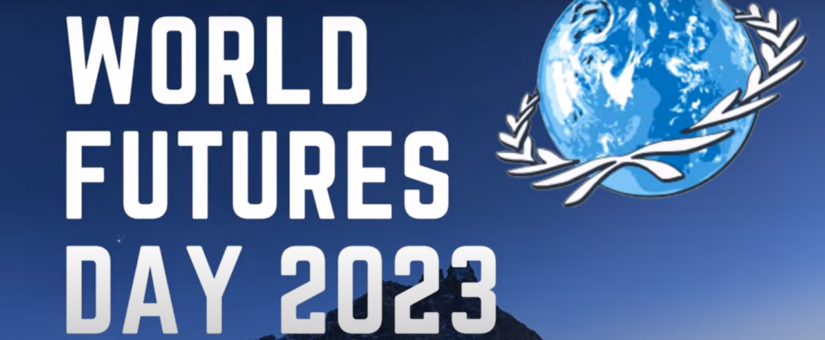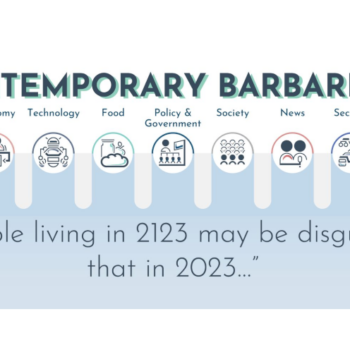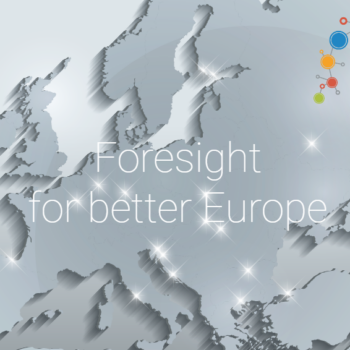
#WorldFuturesDay 2023 short report
- Posted by Mara Di Berardo
- On 2 March 2023
- 0 Comments
World Futures Day was excellent! During the closing session several said it keeps getting better every year. Mara did a great job getting the facilitators organized and training – I did not see any glitches. David not only provided and managed the zoom access, voice to text recording, but became the master of ceremonies (MC) throughout the 24 yours – yes, as far as I could tell, he was on for 24 hours straight!
Well done to the whole team: Mara Di Berardo; David Wood, Paul Epping, and Brock Hinzmann. I am now confident that if I fell off the edge of the earth tomorrow, Word Futures Day 2024 will be excellent.
***
Here’s a brief summary of some of what was discussed by over 700 participants during the 10th anniversary of our 24-hour around the world conversation on the future hosted by The Millennium Project, in collaboration with the Association of Professional Futurists (APF), Humanity+, the Lifeboat Foundation, the World Academy of Art and Science, and the World Futures Studies Federation (WFSF).
You’ll also find some links that were shared by participants during the conversation
(By David Wood with contributions from Jerome Glenn, Mara Di Berardo, and Brock Hinzmann)
***
One of the early themes in the #WorldFuturesDay discussion was community resilience and emergency responses in the face of the recent adverse weather events (e.g. Cyclone Gabrielle) in New Zealand
“Request for an advisory opinion of the International Court of Justice on the obligations of States in respect of climate change” – https://www.vanuatuicj.com/resolution
Question: What are people’s “theories of change” about how the present circumstance can change to one in which foresight plays a more effective role? Answers included: involve the younger generation; raise more awareness of forthcoming threats (without anxiety and depression); rather than just stirring up “the fear of God” with terrifying tipping points, it’s vital to develop and share “some really good stories” – stories that emphasize stronger agency rather than “super optimism” or “super pessimism”; transition from zero-sum geopolitical competition to synergic relations.
Another suggestion: emphasize ‘diplomacy contractors’ in international politics, and rely less on defense contractors.
“Existential Hope: A group of aligned minds who cooperate to build beautiful futures from a high-stakes time in human civilization by catalyzing knowledge around potential paths to get there and how to plug in”: https://foresight.org/technologies/foresight-existential-hope/
Another phrase that participants liked: not “existential hope” but “pragmatic optimism”. Participants were urged: “stop just being “futurist talkers”; instead become “futurist practitioners” and “futurist activists”.
If you want to see the future, look at what organized crime is doing. A thought shared at the start of the second hour of #WorldFuturesDay
Moving on, the conversation weighed up better options for identification – so that (for example) doctors can quickly access important personal health information, without failures of privacy. We heard about potential applications of Web3.
Many parts of our society are deeply dependent on semiconductor chips. What happens when chip production is interrupted? Is that a vulnerability we need to manage better?
Another important vulnerability is the manipulation of elections. The threat isn’t just fake information that leads people to cast their votes in unexpected ways. It’s also the risk of our voting systems being hacked by increasingly sophisticated AI systems.
A 6 minute video featuring Jerome C. Glenn on infowarfare and anticipation and deterrence. In English with Korean subtitles: https://www.youtube.com/watch?v=5c6xYjq4pMs
“The Disinformation Project: Studying information disorder ecologies” – an analysis of “Dangerous speech, misogyny, and democracy”: https://thedisinfoproject.org
A term that was introduced: someone described as a “togetherist”.
Question: What are the most encouraging examples of microcities or alternative local communities?
“Plumia: Building a borderless future through a country on the internet … an umbrella project to increase the global mobility rights of people everywhere”: https://plumia.org/
In the 4th hour of the #WorldFuturesDay discussion: How feasible is an international agreement to prevent militaries putting AI systems into control over nuclear weapons systems?
A recent segment by John Oliver on AI risks – an example of how to make important points clearly via the medium of humour: https://www.theguardian.com/tv-and-radio/2023/feb/27/john-oliver-new-ai-programs-potential-peril
“Instant Future offers both quick jumps and deep dives into futurist prediction … We’re offering a brisk trip to the edge the future itself – an edge that’s always edging away”: https://instantfuture.org/about/
Question: Which aspects of our lifestyle should people consider changing, if they want to live long enough to benefit from the anti-aging therapies that may become available in, say, 5-10 years time?
How have suicide rates changed in recent years, and what are the causes of these changes?
This data is from https://ourworldindata.org/suicide
In the 7th hour of #WorldFuturesDay included discussion of the 15 global challenges. Is accelerating an abundance of clean energy the key to solving a number of the other challenges? https://millennium-project.org/projects/challenges/
“Climate change is creating a global imperative to electrify and accelerate the reduction of fossil fuels. Electrification is projected to increase lithium-ion demand > 500% by 2030. The supply chain is unprepared to support that growth”: https://www.redwoodmaterials.com/
The 8th hour of the #WorldFuturesDay conversation started by considering the potential transnational coordination of methods such as solar geoengineering that inevitably impact more than one country at a time
Another question: How inclusive is the futuristic agenda that’s being discussed? Does it encompass every part of the world including some parts of Africa?
In the tenth hour of #WorldFuturesDay: Should we support the attempt to create a “planet B” option for human existence on Mars? And what about the creation of virtual worlds where people might spend more and more of their time?
Hour 11 of #WorldFuturesDay: Q: We have lots of technological possibilities to improve human society. So why is progress so slow? A: The changes in technology are often a big part of the problem
Hour 12 of #WorldFuturesDay: How should futurists divide their energies between highlighting negative scenarios and highlighting pragmatically optimistic scenarios?
Suggested as a helpful example of 2/2 scenarios: “Radical Ocean Futures − scenario development using science fiction prototyping”: https://www.researchgate.net/publication/320367387_Radical_Ocean_Futures_-_scenario_development_using_science_fiction_prototyping
Hour 13 of #WorldFuturesDay considered the question: How might the world transition to a post-war status (when countries no longer consider war as an option)?
“The Peace Chart lists strategies for Conflict Resolution, Conflict Prevention, and on How to build a more peaceful society. It also cites where the strategy worked, where it did not, and why”: https://millennium-project.org/the-peace-chart-project-update/
Hour 15 of the #WorldFuturesDay conversation started with a pointer to “How will we disgust our descendants?”: https://4cf.eu/how-will-we-disgust-our-descendants/
Hour 16 of #WorldFuturesDay considered which educational tasks will be best done by humans, given the emerging capabilities of AI.
Hour 17 of #WorldFuturesDay reviewed potential technological changes in food production, agriculture, forestry, and fishing. What are the upsides and downsides to these new systems?
“How do you feed 8 billion people, all of whom want access to higher-quality, more nutritious and lower-cost protein?”: https://www.diamandis.com/blog/metatrend-18-cellular-agriculture-and-vertical-farming
Hour 18 of #WorldFuturesDay asked: when will World Futures Days be able to be facilitated by an AI rather than by a human?
Hour 19 of #WorldFuturesDay: “Registration is now open for the Global Futures Forum!”. The C4UNwn vision is “To transform the UN system by promoting inclusive people-centered multilateralism in partnership with civil society, governments, and the UN”: https://c4unwn.org/global-futures-forum/
Hour 20 of #WorldFuturesDay: Governments don’t control most of the money in the world – capital investment companies do – “Force for Good is changing the investment criteria toward a better more sustainable future: https://www.forcegood.org/
Hour 21 of #WorldFuturesDay heard about scenarios for the future of biology, especially measuring and reprogramming epigenetic methylation
Hour 22 of #WorldFuturesDay considered ways in which AI might *not* accelerate into dangerous capabilities as quickly as is often suggested
A question from hour 23 of #WorldFutureDay: Do we believe that there will be plenty of (new) jobs for people, after AI becomes more capable and takes many existing jobs? If not, what options do we have regarding the unemployed?
Hour 24 discussed possible new advancements of AI (including how we will know if AIs become conscious) and the voices of young people in our future.
General AI technologies for search and chat are known to ‘hallucinate’ in a way that could allow foresight researchers to create counterintuitive, but possible futures. Image-generating AI applications are already enabling people to create visions of future scenarios, to help communicate preferences and positive outcomes.
Hour 25 shared considerations about the beauty and usefulness of open spaces like the World Futures Day 24-hour conversation around the world hosted by The Millennium Project. Participants made a toast to conclude the event.
#WorldFuturesDay 24-hour around the world conversation – 10th anniversary – is over! Thanks to all the facilitators and the people who joined and shared their ideas and proposals for the future! See you next year!.




0 Comments